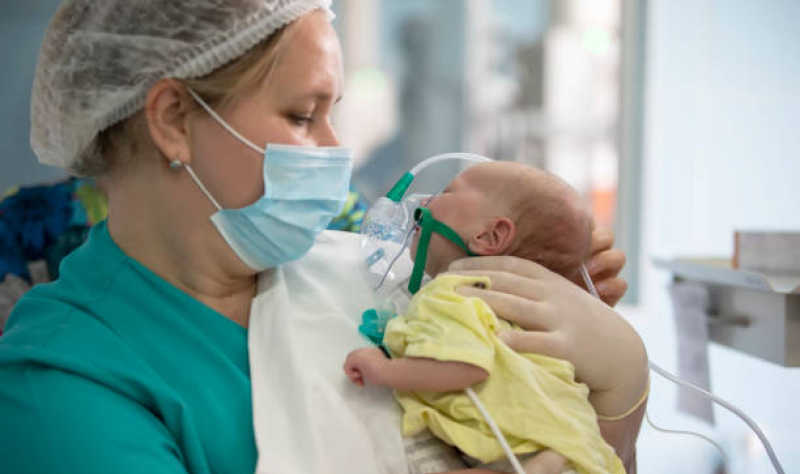Even healthy, full-term infants often develop severe respiratory syncytial virus (RSV) infections, particularly in the first 3 months of life, Swedish researchers reported yesterday in The Lancet Regional Health-Europe.
A team from Karolinska Institutet and the University of Helsinki analyzed national registry data on all children born in Sweden from 2001 to 2022 on RSV diagnoses, sociodemographic factors, underlying diseases, RSV deaths, intensive care unit (ICU) admissions, and hospital stays of 7 days or longer.
“Respiratory syncytial virus (RSV) is the leading cause of acute lower respiratory tract infections (LRTIs) in young children, with the highest burden of disease in low- and middle-income countries,” the study authors wrote. “In 2019 there were globally 33 million cases of RSV in children younger than 5 years, leading to 3.6 million hospitalizations and over 100,000 RSV-related deaths.”
12% of kids with RSV severely ill
Of 2.4 million children, 1.7% were diagnosed as having RSV, corresponding to an incidence of 1,406 cases per 100,000 person-years in children younger than 1 year and 36 per 100,000 person-years in older children. Of children with RSV, 11.9% had severe illness. The median age of children admitted to an ICU was 1.9 months, 41.3% had an underlying medical condition, and the median length of ICU stay was 46.0 hours.
Among these children, 36.1% required supplemental oxygen with a high-flow nasal cannula for a median of 18.9 hours, 25.2% received non-invasive ventilation for a median of 25.3 hours, and 32.1% needed mechanical ventilation for a median of 65.8 hours. The median age of children who died was 6.6 months.
Among all children, risk factors for ICU admission or death included birth in winter (hazard ratio [HR], 2.96), small for gestational age (adjusted HR [aHR], 3.91), twins (aHR, 3.43), having siblings aged 3 years or younger (aHR, 2.92), having a sibling hospitalized for lower respiratory tract infection before age 4 years (aHR, 2.40), and having severe chronic conditions (aHRs, greater than 4).
Underlying diseases were seen in 52.3% of children admitted to the ICU, 42.6% of those with a prolonged hospitalization, and 77.8% of those who died.
In children with RSV infection, risk factors for poor outcomes included small for gestational age (aHR, 2.74), prematurity (very preterm aHR, 3.74; extremely preterm aHR, 5.70), and severe underlying illnesses.
Targeting more children for immunization
In the full cohort, 3,766 children were hospitalized for at least 7 days after RSV infection. The risk factors for prolonged hospitalization were similar to those for ICU admission or death, including winter birth (HR, 3.13), small for gestational age (aHR, 2.22), twins (aHR, 3.63), having older siblings aged 0 to 3 years (aHR, 2.91), and prematurity (very preterm aHR, 10.85; extremely preterm aHR, 19.19).
The study highlights that a large proportion of children who require intensive care due to their RSV infection were previously healthy.
Chronic conditions were tied to an elevated risk of prolonged hospitalization, particularly severe congenital heart disease (aHR, 7.18), Down syndrome (aHR, 7.53), and other severe underlying illnesses (aHR, 9.08). Underlying conditions were less common in seriously ill children younger than 3 months than in their older counterparts (40.3% vs 71.6%).
The authors said the findings strengthen the evidence supporting universal RSV immunization in children. “In settings where universal immunization is not yet feasible, our study provides crucial evidence to guide the prioritization of high-risk groups, not only based on underlying conditions, but on age and other risk factors,” they wrote.
In the United States, infants can be protected against RSV through maternal vaccination or infant immunization with a monoclonal antibody injection.
In a Karolinska press release, senior author Samuel Rhedin, MD, PhD, of Karolinska, said, “We know that several underlying diseases increase the risk of severe RSV infection, and it is these children who have so far been targeted for protection with the preventive treatment that has been available. However, the study highlights that a large proportion of children who require intensive care due to their RSV infection were previously healthy.”
When formulating treatment strategies, it’s important to consider that even healthy infants can be severely affected by RSV, first author Giulia Dallagiacoma, MD, of Karolinska Institutet, said in the release: “The good news is that there is now preventive treatment that can be given to newborns, and a vaccine that can be given to pregnant women.”
